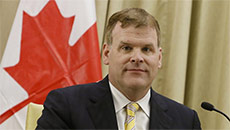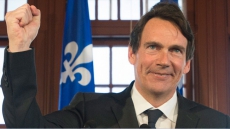OTTAWA — The oil slump is sure to bruise Alberta's housing market, but don't expect real estate in the province to absorb another 1980s-style drubbing, says an internal federal government analysis.
The Department of Finance compared the potential real-estate fallout in Alberta — a result of the late-2014 collapse in oil prices — with the pain inflicted on the provincial market during the deep recession of the early 1980s.
The document was released to The Canadian Press under the Access to Information Act at a time when economic concerns are top of mind for Albertans as they prepare to head to the polls for Tuesday's provincial election.
It underlines how the two downturns shared several similarities in Alberta: rising economic uncertainty, a cooling housing market and a drop in crude prices that followed an extended period of exceptional growth.
At the time the document was produced in late January, the federal government was expecting any real-estate decline this time around to be shorter and have less bite in the province.
The analysis said the "particularly severe impact" sustained by Alberta in the 80s was amplified by an even weaker world economy and higher inflation that fuelled big interest-rate hikes.
Alberta's housing market has seen sales activity slow and prices drop of late. The overall Canadian market has also been experiencing volatility, with prices continuing to climb in cities like Toronto and Vancouver amid a prolonged stretch of low interest rates.
Some experts have warned Canada could be facing price corrections or even a housing bubble.
The Bank of Canada has sought to ease the fears, predicting the market is instead headed for a "soft landing," even though it identified it as a key financial stability risk and estimated the country's housing prices could be overvalued by as much as 30 per cent.
When it comes to Alberta, however, March sales activity — compared to 12 months earlier — slipped by about 30 per cent in Calgary and by nearly six per cent in Edmonton, according to the Canadian Real Estate Association.
From March 2014 to March 2015, the association also found sales prices dipped by 2.2 per cent in Calgary, though they had increased by 4.4 per cent in Edmonton.
In the 1980s, the federal document said house prices in Calgary fell by 31 per cent and by 26 per cent in Edmonton between 1981 and 1985. The declines followed a surge in real-estate activity driven by higher energy prices, it said.
The document, prepared for deputy finance minister Paul Rochon, also blamed Alberta's housing slide in the 1980s on aggravating factors that are no longer present.
The examples include the existence — and eventual failure — of small banks ill-prepared for the boom-time risks. It also highlighted the 1980 introduction of the controversial national energy program, which among other things, shocked the economy by setting oil at a "made-in-Canada price."
The memo pointed to the continued presence in Alberta of "non-recourse" mortgage policies, which it said could make the market more vulnerable "to a more-pronounced cycle of housing-price declines."
Non-recourse mortgages, which often allow homeowners to walk away from their foreclosed homes as well as the outstanding debt, contributed to a spike in the default rate in the 1980s and drove prices down, the document says.
Ottawa doesn't expect a rush of defaults in Alberta unless it's hit by a "major increase" in job losses, the document said. Prime Minister Stephen Harper recently said that debt-servicing costs in Canada had fallen and default rates remained extremely low.
But the more favourable situation in Alberta this time around would only partially offset the drawbacks of lower crude prices, the government document predicted.
"A housing market that over the last decade has been driven in part by higher oil prices cannot remain completely insulated from significant oil-price declines," said the memo.





